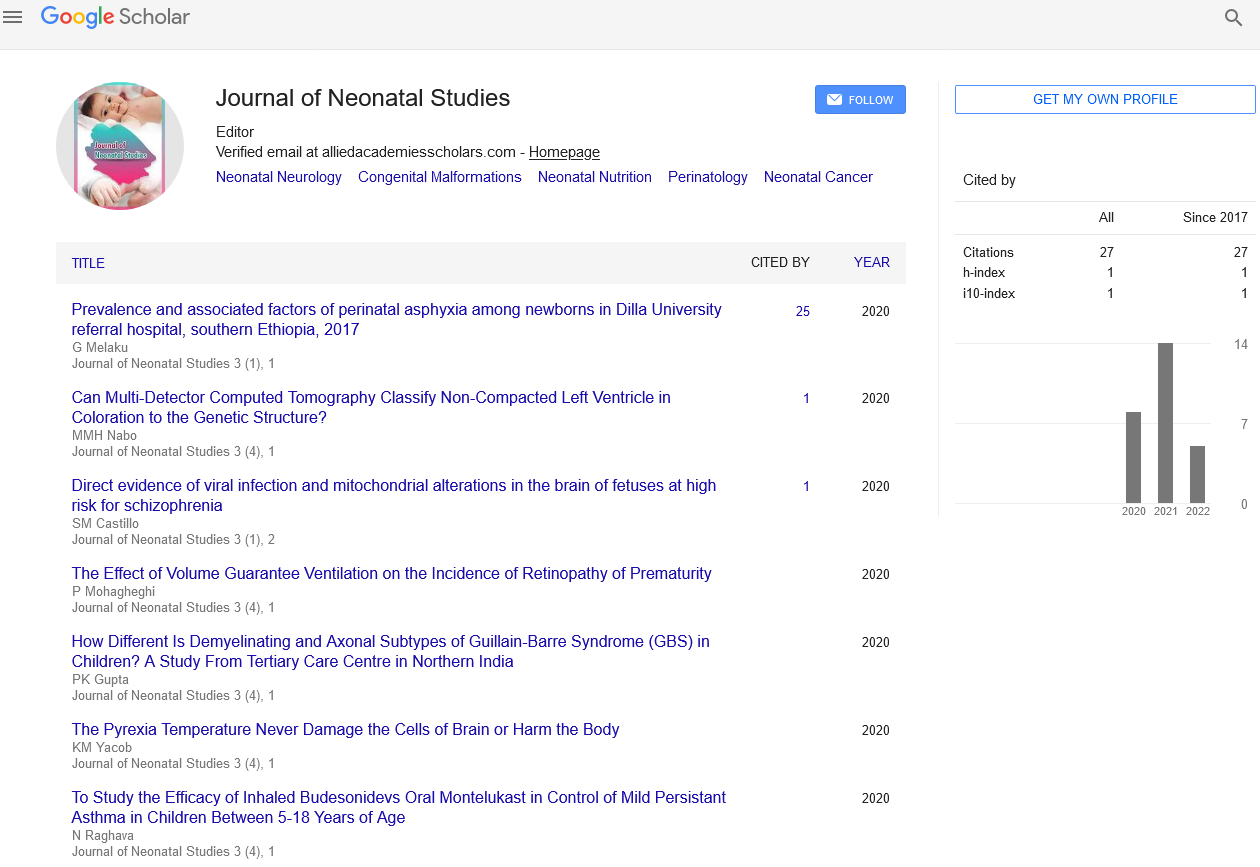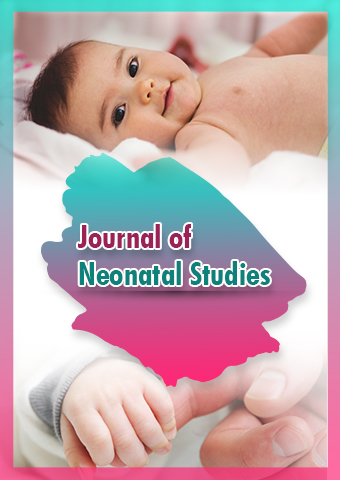Perspective - Journal of Neonatal Studies (2024) Volume 7, Issue 2
Exploring the Vital Role of Neonatal Specialists: Nurturing Newborn Health and Well-being
- Corresponding Author:
- Riku Kenji
Department of Pediatric and Neonatal Intensive Care Unit, University of Tokyo Hospital, Japan
E-mail: rikukenji578@centogene.com
Received: 01-Mar-2024, Manuscript No. JNS-24-130013; Editor assigned: 04-Mar-2024, PreQC No. JNS-24-130013 (PQ); Reviewed: 18-Mar-2024, QC No. JNS-24-130013; Revised: 02-Apr-2024, Manuscript No. JNS-24-130013 (R); Published: 09-Apr-2024, DOI: 10.37532/JNS.2024.7(2).211-212
Introduction
The field of neonatology stands at the forefront of pediatric medicine, focusing on the care and treatment of newborn infants, particularly those born prematurely, with low birth weight, or facing complex medical conditions. Neonatal specialists, also known as neonatologists, play a crucial role in ensuring the health, survival, and long-term outcomes of these vulnerable newborns. In this comprehensive guide, we delve into the world of neonatal specialists, exploring their training, expertise, responsibilities, and the impact they have on the lives of newborns and their families.
Description
Understanding neonatal specialists
Who are neonatal specialists? Neonatal specialists are medical doctors who specialize in the care of newborn infants, particularly those born prematurely or with medical complexities requiring intensive medical attention. These highly trained professionals possess specialized knowledge and expertise in neonatal medicine, encompassing a broad range of medical conditions, treatments, and interventions specific to the neonatal population.
Training and education: Becoming a neonatal specialist requires a rigorous and comprehensive educational pathway, beginning with a medical degree from an accredited medical school. After completing medical school, aspiring neonatologists undergo residency training in pediatrics, typically lasting three years, followed by additional fellowship training in neonatal-perinatal medicine, which can range from two to three years.
During fellowship training, neonatal specialists gain hands-on experience in Neonatal Intensive Care Units (NICUs), where they learn to manage complex medical conditions, provide specialized treatments, and collaborate with multidisciplinary teams to optimize neonatal outcomes. Fellowship training also encompasses research, teaching, and scholarly activities to enhance knowledge and expertise in neonatal medicine.
Expertise and specialization: Neonatal specialists possess specialized expertise in the unique medical needs of newborn infants, including respiratory support, nutritional management, developmental care, and the management of congenital and acquired conditions. They are skilled in performing procedures such as intubation, umbilical catheterization, and lumbar puncture, as well as interpreting diagnostic tests and imaging studies specific to the neonatal population.
Neonatal specialists may further specialize in areas such as neonatal neurology, neonatal surgery, or neonatal cardiology, depending on their interests, training, and professional goals. This specialization enables them to provide comprehensive, evidence-based care tailored to the specific needs of each newborn infant under their care.
The role of neonatal specialists
Providing critical care in the NICU: Neonatal specialists play a central role in the care of newborn infants admitted to the NICU, providing round-the-clock medical supervision, monitoring, and intervention to support their health and well-being. They collaborate closely with neonatal nurses, respiratory therapists, nutritionists, pharmacists, and other allied healthcare professionals to deliver comprehensive, multidisciplinary care to neonatal patients and their families.
In the NICU, neonatal specialists manage a wide range of medical conditions and complications, including prematurity, respiratory distress syndrome, congenital anomalies, sepsis, and neurological disorders. They oversee the use of advanced medical technologies and interventions, such as mechanical ventilation, surfactant therapy, neonatal surgery, and therapeutic hypothermia, to optimize neonatal outcomes and improve long-term prognosis.
Supporting families and caregivers: In addition to providing medical care to newborn infants, neonatal specialists play a vital role in supporting and educating families and caregivers throughout the neonatal journey. They offer compassionate, family-centered care, fostering open communication, trust, and collaboration to empower parents to participate actively in their infant’s care and decision-making process.
Neonatal specialists provide guidance and counseling to families facing complex medical decisions, end-of-life care, or long-term developmental concerns for their infants. They offer emotional support, resources, and referrals to community services to help families navigate the challenges and uncertainties of the neonatal experience with resilience and strength.
Advancing research and innovation: Neonatal specialists contribute to the advancement of medical knowledge and practice through research, innovation, and quality improvement initiatives aimed at enhancing neonatal care and outcomes. They conduct clinical trials, translational research, and epidemiological studies to investigate new treatments, interventions, and strategies for improving neonatal health and well-being.
By participating in professional organizations, conferences, and collaborative networks, neonatal specialists stay abreast of the latest developments, guidelines, and best practices in neonatal medicine. They contribute to the development of clinical protocols, guidelines, and standards of care to promote evidence-based practice and ensure the delivery of high-quality, safe, and effective care to neonatal patients worldwide.
Challenges and considerations
Ethical and moral dilemmas: Neonatal specialists often grapple with complex ethical and moral dilemmas, particularly in situations involving end-of-life care, resource allocation, and decision-making for critically ill newborn infants. Balancing the principles of beneficence, autonomy, non-maleficence, and justice requires thoughtful consideration, sensitivity, and collaboration among healthcare providers, families, and ethical committees.
Work-life balance and burnout: The demanding nature of neonatal medicine, with its high acuity, long hours, and emotional intensity, can take a toll on the well-being and resilience of neonatal specialists. Achieving a healthy work-life balance, prioritizing self-care, and fostering supportive work environments are essential for preventing burnout and promoting professional satisfaction and longevity in the field.
Access to care and disparities: Disparities in access to neonatal care, resources, and specialized services remain a significant challenge, particularly in underserved communities and low-resource settings. Neonatal specialists play a crucial role in advocating for equitable access to high-quality neonatal care, addressing social determinants of health, and implementing strategies to reduce disparities and improve outcomes for all newborn infants.
Conclusion
Neonatal specialists are integral members of the healthcare team, dedicated to providing compassionate, evidence-based care to newborn infants and their families. With their specialized knowledge, expertise, and commitment to excellence, neonatal specialists play a vital role in improving neonatal outcomes, advancing medical knowledge, and shaping the future of neonatal medicine.
As champions for the health and well-being of newborn infants, neonatal specialists embody the principles of compassion, integrity, and advocacy, striving to ensure that every newborn receives the highest standard of care, regardless of their medical complexity, socioeconomic status, or geographic location. Through their unwavering dedication and passion for neonatal care, they make a profound and lasting impact on the lives of newborns and their families, nurturing hope, healing, and resilience from the very beginning of life.

